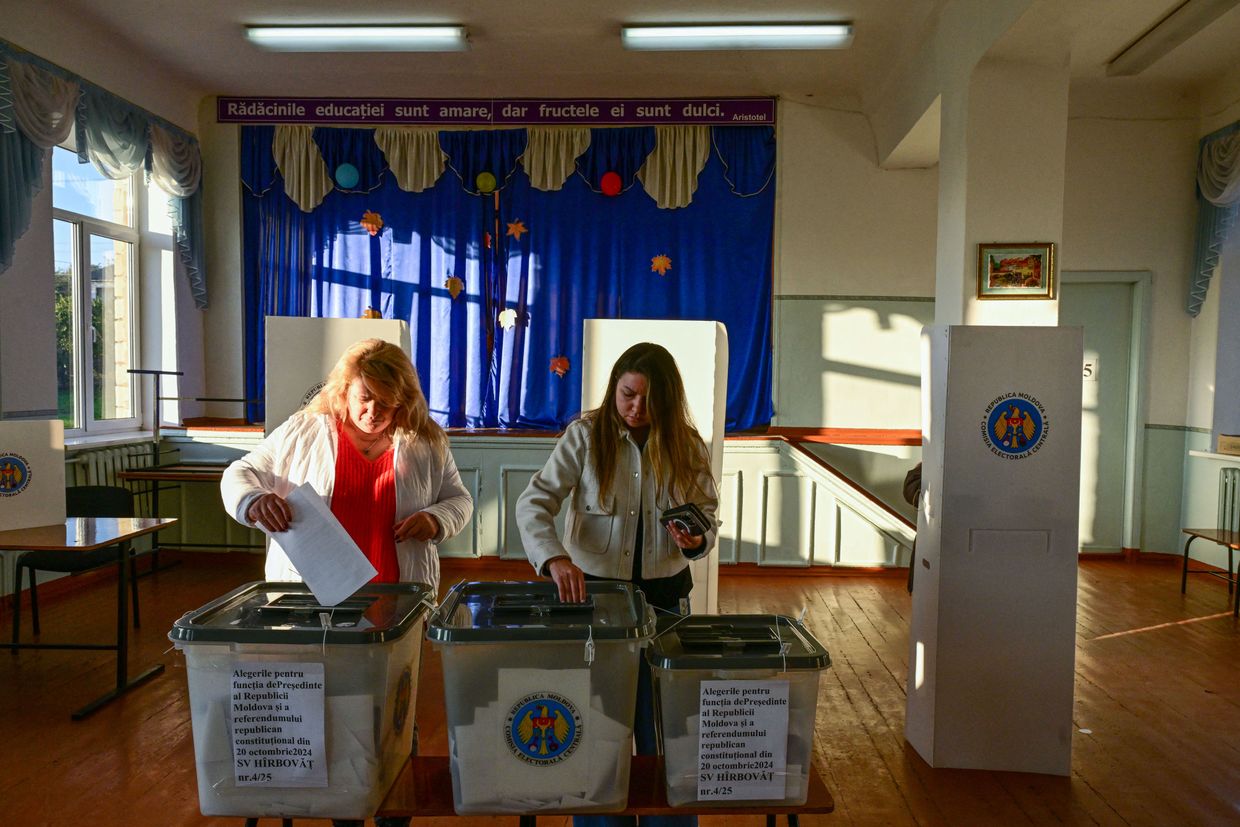Sandu wins in Moldova despite 'unprecedented' Russian interference

In a victory for pro-EU factions in Moldova and beyond, incumbent President Maia Sandu defeated her challenger, Alexandr Stoianoglo, in the country's Nov. 3 presidential runoff.
Sandu won on Nov. 3 by a margin of about 55.4% to 44.6%, with 99.9% of votes counted.
"We proved that by uniting we can defeat those who wanted to bring us to our knees," Sandu told reporters in Chisinau in the early hours of Nov. 4.
She wasn't just talking about Stoianoglo. Sandu has long insisted that the real opponent to her government and Moldova's European path is the Kremlin, which has been waging a hybrid war designed to push Chisinau back into Moscow's orbit.
In what Sandu described "a fraud of unprecedented proportions," Russia allegedly had its hand in a massive effort to influence Moldova's elections, aiming to unseat Sandu and quash the nation's EU aspirations.
"Ukraine supports the European choice of the Moldovan people and stands ready to work together to strengthen our partnership," President Volodymyr Zelensky said on X while congratulating the Moldovan president.
While Sandu's victory on Nov. 3 was decisive, it wasn't assured.
Sandu's failure to secure a majority in the first round of voting on Oct. 20 came as a shock to many. In the same vote, Moldova's referendum on enshrining the country's EU accession path to the constitution won by only 11,000 votes.
The president advanced to the November runoff as accusations of electoral fraud — and doubts about Sandu's ability to stay in power – mounted.
"We fought fairly in an unfair fight—and we won," Sandu said after the Oct. 20 elections.
"But the fight isn' t over."
Bomb threats and bought votes
Opinion polls leading up to the Oct. 20 referendum showed that a majority of Moldovans supported the constitutional amendment on the country's path to the EU. When the amendment passed by the slimmest of margins, Sandu and others sounded the alarm on Russian interference.
Moldovan authorities, independent observers, and officials from the EU and U.S. cited a malign influence campaign involving criminal networks and political groups tied to Russia.
Moldovan lawmakers claimed that Moscow spent millions of dollars backing Stoianoglo, a former top prosecutor supported by the pro-Kremlin Party of Socialists.
Over $15 million in Russian funds have reportedly been funneled to over 130,000 Moldovans, with voters instructed on how to cast their ballots in the election. Pro-Russian oligarch Ilan Shor, a Moldovan-Israeli tycoon, was accused of laundering the money and orchestrating the network.
Sandu said in a press conference ahead of the referendum that up to 300,000 votes were linked to the bribery scheme.
Prior to the November runoff, a Moldovan government source said that Moscow might target polling stations abroad with disruptive tactics, including bomb threats, in an attempt to suppress the staunchly pro-EU expatriate vote.
Stanislav Secrieru, Sandu's national security adviser, said that the presidential runoff was characterized by "massive interference," including bomb threats, cyberattacks, and coordinated voter transport in the Russian-occupied Transnistria region.
"We're seeing massive interference by Russia in our electoral process as Moldovans vote in the presidential runoff today—an effort with high potential to distort the outcome," Secrieru said on X.
Secrieru posted photos and videos reportedly showing organized voter transport efforts and a voucher for a free restaurant meal offered to Moldovan diaspora voters in Moscow, among other evidence of disruption.
When Sandu won by a clear margin despite "unprecedented interference," Secrieru declared it a triumph for democracy.
"Moldovans made their voices heard loud and clear. ... Democracy has prevailed."

Sandu v. Moscow
This election is not the first time Sandu has accused the Kremlin of attempting to oust her from power.
While Russia has long sought to influence Moldova, Moscow's pressure on the country increased after the election of pro-Western Sandu in 2020.
In Feb. 2023, Sandu said that Russia was planning to overthrow the government of Moldova under the guise of seemingly organic protests that would then turn violent. The plot was prevented, but the situation was "really dramatic."
Sandu then alleged in October 2023 that Wagner Group founder Yevgeny Prigozhin was directly involved in the plot, which was part of a broader effort to destabilize Moldova.
Russia aims "to overturn the constitutional order, to change the legitimate power from Chisinau to an illegitimate one that would put (Moldova) at Russia's disposal to stop the European integration process," Sandu said.
The Kremlin also hopes to use Moldova to support its full-scale invasion of Ukraine, she said.
A leaked Russian government document reportedly lays out Moscow's 10-year plan for Moldova, a plan which envisions Russia gaining vast control over the country by 2030.
Under the plan, Transnistria would remain a breakaway region and Russian troops would remain there. Russian media should be widely prevalent and the Russian language must gain official status.
Sandu's latest victory is unlikely to curb the Kremlin's ambitions in Chisinau. As Georgia's recent parliamentary elections show, campaigns of fraud and intimidation can effectively reverse a country's progress away from Russia.
For the moment, though, Sandu is grateful to celebrate the victory.
"Moldova, today you are victorious," she said on X.
"Together, we’ve shown the strength of our unity, democracy, and commitment to a dignified future."













